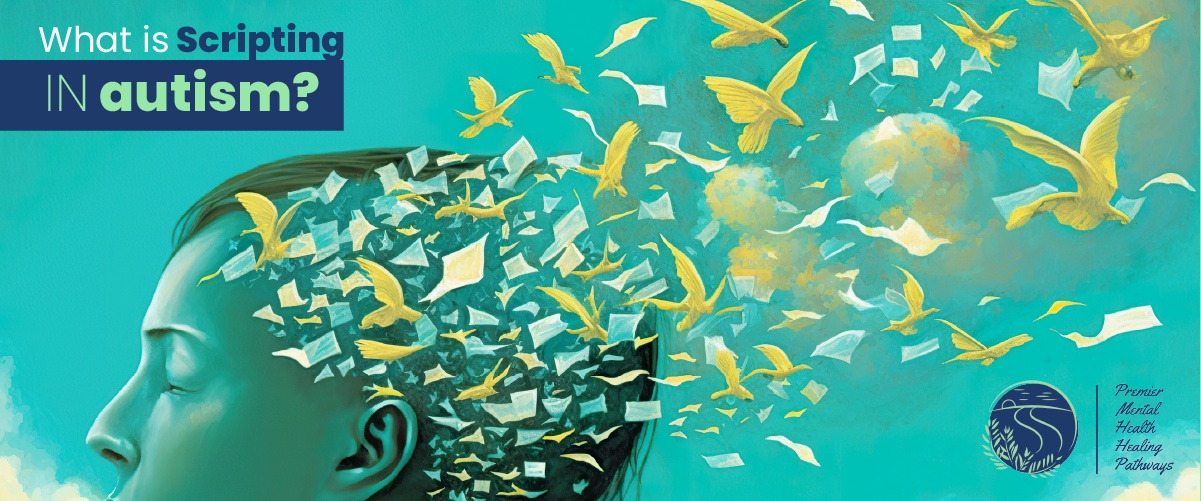What is scripting in autism?
People who have autism spectrum disorder (ASD) may find it hard to communicate, which can make daily life very difficult.
People with ASD often repeat words, phrases, or whole sentences from TV shows, movies, books, and other sources. This is called scripting.
You can get help from Premier Mental Health Healing Pathways to take good care of your mental health. They are experts at helping people with autism.
Some people might find scripting strange, but it has many uses for people with autism and can tell you a lot about their needs and preferences.
Let’s look into detail what is scripting in autism?
What is Scripting in Autism?
Scripting is a type of echolalia, which is when you repeat sounds that other people have made.
People can repeat something they just heard right away, which is called immediate echolalia, or something they remember later, which is called delayed echolalia.
People who are scripting often do the second type, where they repeat familiar phrases that they have stored in their memory.
Types of Scripting
There are two main types of scripting:
- Functional Scripting: When people use functional scripting, they use scripted language to discuss their basic needs, wants, or feelings. A child might say, “I want juice,” by repeating a phrase they saw on their favorite TV show.
- Non-functional scripting: Non-functional scripting is when you read language that does not have a specific purpose for communicating. This kind of scripting could be a way to self-regulate, calm down, or stimulate, which are repetitive behaviors that give you sensory input.
Characteristics of Scripting Autism
Scripting autism has some important traits that set it apart from regular communication. Here are the key characteristics:
- Repetitive: People with autism often repeat certain words, phrases, or lines from movies or shows. This repetition gives them a sense of comfort and consistency.
- Echolalia: This is when someone with autism repeats words or phrases they’ve heard, either right away or later on. It’s like echoing what they’ve heard.
- Contextual Usage: Even though they use scripts, individuals with autism can pick the right phrases for the situation. This helps them join conversations and express themselves.
- Limited Spontaneous Language: While they may rely on scripts, people with autism might find it hard to come up with new words or start conversations on their own.
Understanding these traits helps us create an environment where people with autism feel understood and supported in their communication. It’s all about accepting their unique way of expressing themselves.
Why Do Autistic People Use Scripting?
People with autism use scripting for many reasons that make it easier for them to talk to others and handle social situations.
- Making communication easier: scripting gives people ready-made sentences or phrases they can use to say what they want to say without having to work too hard. This makes it easier and faster for us to talk to each other.
- Socializing: Scripting can be a fun and useful way for autistic people to meet new people. Sharing lines from movies or TV shows that you love can bring people together and make interactions more fun.
- Masking: Scripting is something that some autistic people do to hide their autistic traits and act like everyone else. When autistic people try to hide their differences in order to fit in with society, this can be especially common.
- Stimming: Scripting is a type of self-stimulatory behavior. Speaking familiar lines or phrases can be relaxing and fun, and it can also help people control their emotions and deal with sensory input.
Overall, scripting is a useful skill that helps autistic people communicate, make friends, and control their feelings in different situations.
Autism Scripting Examples
Here are some examples of scripting for autism:
- Quotes from movies or TV shows
People with autism may repeat lines or phrases they have heard in their favorite movies or TV shows. Quotes like “May the Force Be with You” from Star Wars or “To Infinity and Beyond” from Toy Story are a good example.
- Repetitive Phrases
They may say the same words or phrases over and over. One example is saying “I am okay” over and over again in different situations, even if they are actually okay.
- Conversations from Memory
Some autistic people talk out loud whole conversations they have had or heard before. They could talk about these talks again as if they were happening right now because they remember them.
- Scripted Answers to Questions
If you ask them a question, they might give you a scripted answer instead of a real answer. For instance, saying “I am fine, thank you” when asked how they are, even if they do not feel that way.
- Song Lyrics
As another way to script, autistic people may repeat song lyrics. They might sing or recite the words to their favorite songs over and over because the familiar sounds and words make them feel better.
Treatment and Support Options

There are different ways to treat and help people with autism, and not all of them need treatment.
But some people might need help in the following areas:
Speech Therapy
People with autism may benefit from help with language, speech, and communication. It can be helpful to see a licensed speech-language pathologist (SLP) who knows about gestalt language processing.
Additional Communication Tools
Sign language, augmentative and assistive communication devices (AAC), picture cards, and typing can help those who find spoken speech tiring or difficult.
Occupational Therapy
Occupational therapists (OT) can help with fine motor skills, activities of daily living (ADLs), and addressing sensory differences. They can also make sensory diets.
Therapy for Mental Health
Stress, anxiety, depression, burnout, and other mental health problems can be helped by counseling or psychotherapy. Working with a therapist who supports autistic people can be a safe place to talk about problems and strengths.
In conclusion, what is scripting in autism?
Scripting is a common and useful way for people on the autism spectrum to communicate.
Some people might find it strange, but it has many uses, like making it easier to talk to others, making friends, hiding things, and feeling better by stimming.
Understanding and accepting scripting as a valid form of expression is key to making places where people with autism feel supported and understood in the way they communicate, which is unique to them.
FAQs
How do I know if my child is scripting?
“Scripting” means repeating sounds, words, or phrases from other people’s speech. Most of the time, when they script, words and sounds come from movies, TV, books, or people they talk to. Kids on the autism spectrum who are just starting to learn how to talk often script.
How to reduce scripting in autism?
Using high-level reinforcement for long periods WITHOUT the behavior is an effective way to stop scripting.
How do you make someone with autism feel better?
Always do your best to be kind and encouraging. Find out what they like to do for fun and try to find things you have in common with them.






No comment